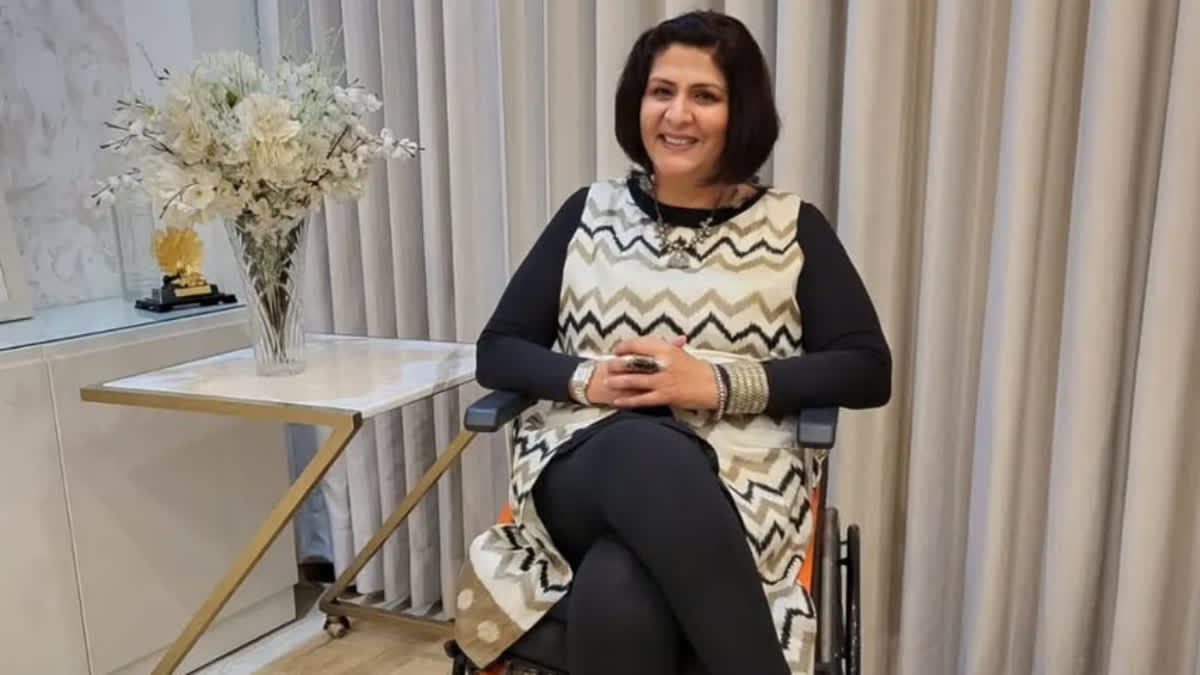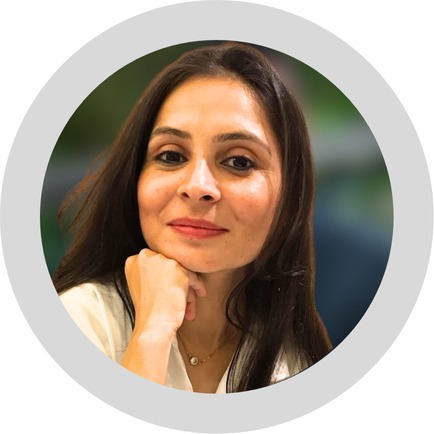If we have to trace the journey of India's first Paralympic silver medal winner and Khel Ratna recipient Deepa Malik, it would be nothing short of an inspiring Bollywood movie. Her journey has been about breaking the stereotypes and myths around disability. She says that she was labelled as dependent, a financial burden, a mother who will not be able to bring up her children, and a dead body which breathes. However, she broke those notions and proved that wheels give her mobility and that a person sitting in a wheelchair is not bound. An ace swimmer and javelin thrower, she started removing labels she was given ever since she was a young girl and went on to win the Olympic medal for the country and receive Padma Shri from the government of India. She opened her restaurant to remove financial dependency and joined sports to clear her identity as a patient. A woman full of life and adventure, Malik is an inspiration for many. It is this journey that made the former president of the Paralympic Committee of India to be a part of Absolut #UNLABEL campaign about looking beyond stereotypes. We spoke to the para-athlete and author of the book Bring It On to mark National Girl Child Day and inspire many girls out there who dream big and want to make the nation proud despite many odds and stereotypes. Excerpts from the interview:
Your journey is nothing short of extraordinary. Can you share the defining moments from your life that shaped who you are today?
My illness as a child, because I was barely five years old. My parents noticed and that noticing also spoke a lot about how lucky I was to be born to a set of parents who had progressive thinking. I think those four years of my childhood taught me patience, positivity, perseverance, parenting and persistence. It taught me everything which stayed with me subconsciously. I also learnt how to bounce back and reclaim what I had. A little bit of rebel was also born with a positive streak. If everybody doubted my physical condition, then I must play sports to prove a point. I must start cycling again. I must do things which make people believe that there is ability beyond disability. It is not just a disability which is going to define you for a lifetime.
What role did your family play in helping you overcome challenges in life?
My parents taught me that the sense of pride never comes from external appearances but from who you are within. That was the biggest contribution from my parents. When I got paralysed I was a mother of two, despite being a person with a disability, my elder daughter took on so much. My disability in turn became her rehabilitative and occupational therapy because whatever mobility she had, she had to help a bedridden mother. The children were extensions of my body. I am bathing them, and in turn, they are pouring water on me. We grew up together. My husband was posted in Kargil so he could not be with me. My daughters moved with me everywhere I went for my sports training.
What inspired you to take up sports after your paralysis?
Sports was just another medium to prove ability beyond disability. People were not talking about social integration, accessibility, and opportunities. What was discussed was sympathy, empathy, and trying to tell me to just be happy and accept God's will. Once I shifted gears to sports, I shocked the world with what a woman in her late 30s with a chest below paralysis could do. I think there's no better place to be other than sports despite being way beyond the age of playing as per the stereotypical age that people normally think.
Winning a Paralympic medal is a historic achievement. Can you describe the emotions you felt when you won silver in the shot put at the Rio 2016 Paralympics?
It was a paradoxical moment for me. I was very happy that I had become the first Indian woman ever in any sport to win a medal for my country. Finally, I could be an instrument of proving these initiatives right and also becoming a symbol of inclusion in policies. I was a living example that a 46-year-old woman can also win a medal for the country. It became aspirational for many women. However, what made me sad was that it took India seven decades of independence to become the first Indian woman to win a medal. Another feeling was a sigh of relief. My honesty, my integrity and my hard work were proved right because, for a throw of 4.48 meters in the final selection trial, I was dragged to the high court by a fellow athlete. I proved all of it wrong with my performance.
How has your experience as an athlete changed since you became the president of the Paralympic Committee of India?
It was a lot of learning experience on the governance aspect of it because initially, you are working only for your single medal here you are working for medals for the country in different sports. My experience as an athlete worked because I understood what a time-bound deliverance is. I was one of them and there was a sense of faith and belief when I said something that let us do things in a certain way.
What is your message to young women and girls who are hesitant to pursue their dreams due to societal or physical limitations?
I always say that people will look at you the way you look at yourself. If you are beaming with self-confidence and self-discipline people will believe in you. There is no magic wand but there is a commitment to the passion. You need to be disciplined in what you are passionate about, prioritise those passions and be honest with not just yourself, but the passion as well. Whenever you do something with true heart and honesty, you will always attract support. Never play the victim card as that will lead to you being victimised. You need to find solutions and find the opportunities. No one will find them for you. I had to research, talk to people and send 1000 emails to get funding for my bike. Another thing is to be hungry and not be shy to ask for help when you need it.
How do you view the evolution of para-sports in India, and what changes do you think are still needed?
If we see the evolution, we see the increasing participation of women. The Paralympics has contributed to medals every year since 2016. We have given India the first podium finish in track and field at either event. We have been able to bid for the World Para Athletics and will conduct the event this September 2025 which is a huge achievement. We have reached a point where the world is trusting us to conduct an event on such a large scale. This will contribute to the rise of infrastructure for para-sports.
What hobbies or activities do you enjoy outside of sports?
I am a biker at heart. I love outdoor adventure and driving. It's meditative and therapeutic for me. I love travelling, seeing historical monuments and reading about the culture of other countries. I'm a foodie by nature and love experimenting with new places where you have food of different kinds. Adventure sports give me that adrenaline rush. Whether it is rafting, paramotoring, scuba diving or swimming along with dolphins underwater, I have done it all despite my chest below paralysis. I love dancing, not that I've learned any dance form, but if music is playing, I am the first one on the floor.
How do you handle moments of self-doubt or frustration?
I have learned the ability to switch to solution mode. As an army officer kid, we were always on a transfer. I have changed nine schools in 12 years of my school life. This whole nature of adaptability and accepting change taught me to find solutions. It helps me deal with self-doubt and frustrations. I'm never shy of asking for help because whenever you are in doubt you need guidance.
How has your experience as the former president of the Paralympic Committee of India shaped you?
Being a part of the Asian Paralympic Committee, there is a lot of responsibility in creating opportunities for para-athletes in the South Asian region as well as the Asian region. My administrative duties have gone beyond the National Paralympic Committee. So that's where one is working and trying to make it a better space because what we have seen is that the Asian region has not come out as a strong administrative power in the world. We need to take Asian representation at the world level and now that's where I'm working.
How do you envision the future of para-sports in India, especially for young athletes?
We will be having the new crop of Parathletes coming up and now the new crop will be very strongly armed with holistic preparations. India is gearing up for the 2036 Olympics, a Paralympics is coming parallel to it. The future of Para sports in India is very bright. We have come to a stage where we are conducting world-level competitions and doing it with a lot of success and the world is looking at India. It is very natural for India to take the lead not just in one direction, but all directions and sports have become a priority for our governance.
Tate à Tate
One thing most people don’t know about you?
I am a great cook
A sport you’d love to try but haven’t yet?
Gymnastics
If you could have a conversation with any historical figure, who would it be and why?
APJ Abdul Kalam. I would love to sit across from him and understand what it takes to be humble and always in the pursuit of knowledge and encouraging simplicity and minimalistic nature yet giving back everything to the country.
Read More:



